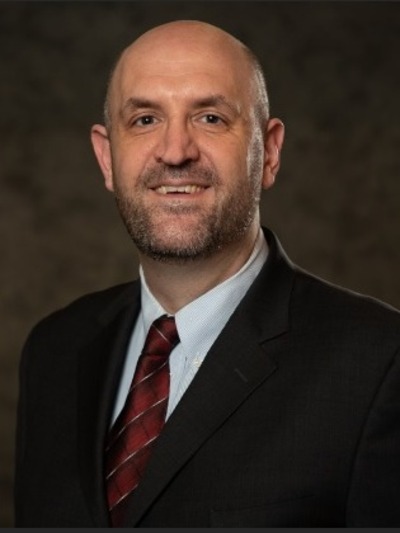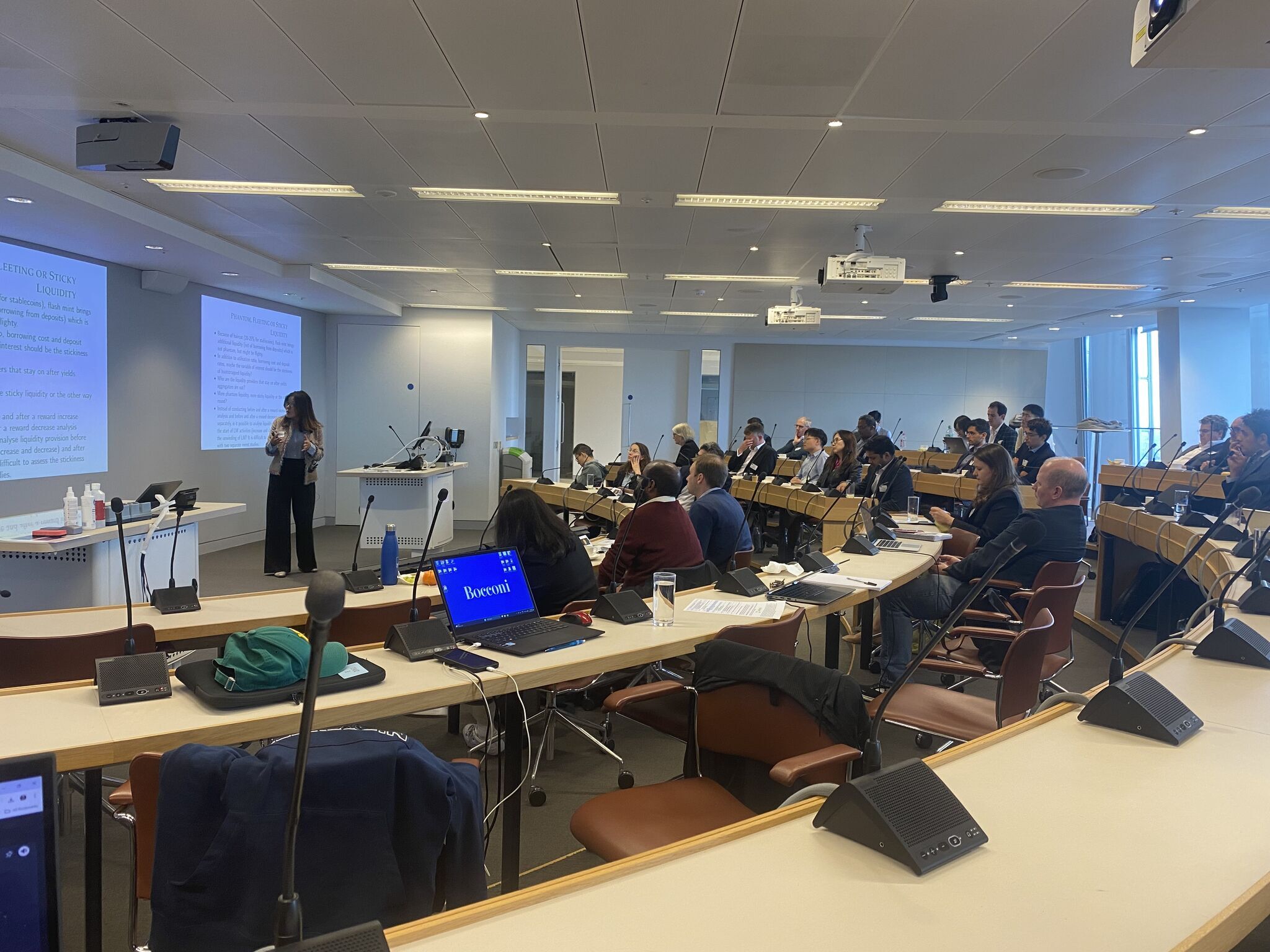Buying crypto? Associate professor of finance Tom Shohfi would like a word

Tom Shohfi was a Financial Economist working with the U.S. Security and Exchange Commission, when he made the decision to come to the Mike Ilitch School of Business as an Associate Professor of Finance.
“I really missed teaching, being in the classroom and being a professor,” said Shohfi. “I’m new to the school, but I’m very excited to be here. It’s a world class facility with a great student population and faculty that produces excellent research and teaching. It was a great fit, both personally and professionally for me.”
From college to the SEC
Born and raised in Long Island, New York, Shohfi completed an undergraduate degree in computer science and mathematics from New York University, before going on to complete an MBA from the University of North Carolina. Shortly after, he began a Ph.D. at the University of Pittsburgh where he discovered a passion for academic research.
“I don’t think I really knew what I was getting into when I first started,” explained Shohfi. “Being a professor sounded like a good thing to do, but really learning what it takes to produce excellent research and developing an idea from scratch and communicating it effectively came about from the excellent professors I had there.”
He went on to Rensselaer Polytechnic Institute where he served as an Assistant Professor of finance and accounting, before pursuing a position at the SEC.
“I wanted to spend some time at a regulator and the SEC is the world’s premier financial securities markets regulator,” Shohfi explained. “I decided to move to DC with my family for a couple of years. My wife’s sister lived in the Virginia area, so we were happy to be closer to her.”
De-mystifying crypto currency
At the SEC, Shohfi was a part of the Division of Economic and Risk Analysis, which produces high-quality research to help inform the SEC in their mission to regulate the securities markets. Shohfi dove into research investigating aspects of cryptocurrency that tend to fly under the radar.
“I’ve been interested in crypto for a long time, going back to my Ph.D. program, but I think part of the reason I wanted to go work at the SEC is because I had students telling me that their parents were quitting their jobs to become crypto traders and they were buying really speculative tokens,” said Shohfi. “I felt like I was trying to educate my students on these markets and how they work and that there are potentially good investment opportunities, but there’s a lot of bad opportunities. I felt like I could make more of a difference at the regulator.”
Shohfi’s first challenge was building a stronger set of data to use in research projects. Using his background in information technology and computer science, Shohfi helped identify an empirical data set for the SEC that has been used to inform much of the SEC’s research into crypto. Shohfi used that data to develop research into new developments, including changes introduced by Robinhood, a popular trading platform.
“When you execute trades on Robinhood, they basically receive money from wholesalers when they are sent the order flow. When the order flow is considered less informed, Robinhood makes more money and they’re making more money from crypto dollar for dollar than any other asset class,” explained Shohfi. “They’re making about four and a half times as much per dollar off order flow from crypto as they are from options.”
This represents a shift from the commissions-based compensation typical in this industry. Brokers complete trades for customers, and because they receive a small percentage of the trade, they have an incentive to execute the trade in the most profitable way possible. With pay for order flow, Robinhood sells a wholesaler the right to conduct trades on their behalf, paying them a flat rate per transaction.
The real money comes from wholesalers trading against these uniformed retail orders, to profit above and beyond what they are paying Robinhood for the right to execute these orders. A wholesale firm may tell Robinhood they executed the trade at a higher cost than they actually did and pocket the difference. This practice was recently banned in the European Union and is illegal in the U.K. and in Canada.
“I think that something people really need to understand is that free crypto trading is not necessarily free, and the cost can be very large even compared to stock options trading on the platform,” said Shohfi. “If the wholesaler is paying money for your trade, they probably don’t want to execute in the best way possible. The only thing constraining them is competition between wholesalers to provide good execution quality for the broker.”
 For Shohfi, this is a conflict of interest that he hopes will see some attention from the U.S. government.
For Shohfi, this is a conflict of interest that he hopes will see some attention from the U.S. government.
“I’m hoping we will see some action from congress in the next term potentially to provide clarity about who is going to regulate crypto, because the SEC has been regulating through enforcement which is the only thing they can do because they don’t have specific guidance from congress,” Shohfi explained. “We need more certainty about the regulatory frameworks for these platforms and these tokens going forward.”
To London and Dubai
After coming to the Ilitch School, Shohfi was invited to present his paper at two conferences, a digital conference held from Dubai, and an exclusive research conference in London.
“My paper was extremely well received in London, I had some really nice comments from people at the conference and on LinkedIn saying that this is something we don’t study a lot because of a lack of data,” said Shohfi. “This conference was only like eight or nine papers, primarily focused on decentralized finance but they found our paper to be very interesting.
“They have a beautiful office in what’s called The Shard, which is a building near London Bridge, so we had a gorgeous view of London from the building, and it was great to finally get some very detailed feedback on our paper from people who are experts in market microstructure and crypto.”
At the Ilitch School

Shohfi brought his expertise to the Mike Ilitch School of Business, to help teach students about these cutting-edge financial topics. Anand Jha, chair of the Finance Department, was thrilled that Shohfi would be bringing his expertise to Ilitch Business finance students.
“The cryptocurrency market has surged past $2 trillion, but research in this fast-evolving field remains limited,” said Jha. “Interest from students eager to learn about cryptocurrency is also growing. We are fortunate to have Dr. Shohfi, a leading researcher, not only diving into these crucial topics but also sharing his insights with our students”
Ilitch School Dean Virginia Kleist was also glad to bring Shohfi onto the faculty, commenting that “we are remarkably pleased- and fortunate- to have Dr. Tom Shohfi as part of the Ilitch School Finance Department faculty. His deep expertise in research, combined with his impressive experience at the SEC, make him a tremendous asset to our students and our academic community. Dr. Shohfi’s research into cryptocurrency is timely and insightful, helping others navigate this evolving space with greater clarity. It’s inspiring to see him share his knowledge and passion both inside and outside the classroom.”
Shohfi hopes that through his work, people will become more informed to make smarter decisions about cryptocurrency, and that regulators will give this industry the attention that it needs.
“I really want to bring awareness to important issues that don’t get a lot of attention from academic research,” said Shohfi. “I want to educate people about how these trades are executed because they should understand the costs associated with their trading, and so they can make informed decisions.”
-Patrick Bernas, Information Officer III
The Wayne State University Mike Ilitch School of Business prepares students for challenging and rewarding careers, advances the boundaries of scholarly and practitioner knowledge, and enhances the economic vitality of the city of Detroit, the state of Michigan and beyond through its programs, research and community engagement. Established in 1946, the business school was renamed in 2015 in recognition of a $40 million gift from Mike and Marian Ilitch. Thanks to this lead investment, the school moved to a new state-of-the-art building in the heart of the District Detroit in 2018, and academic programming and collaboration with city businesses are expanding. For more information, visit ilitchbusiness.wayne.edu.